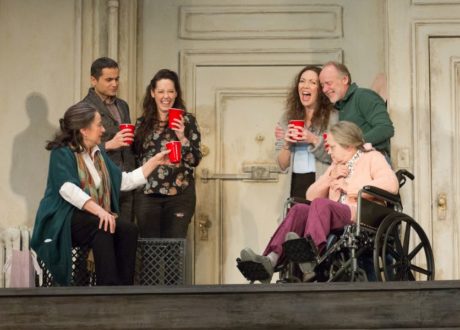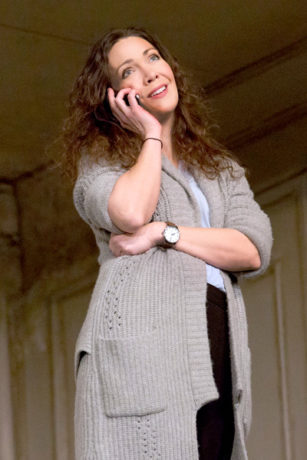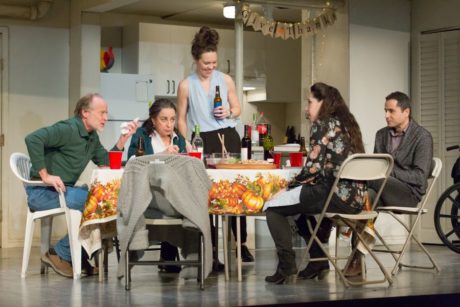The Blakes are not your ordinary dysfunctional family. As they gather for Thanksgiving dinner in an unfamiliar locale, everything seem fine, if a little off-kilter; they engage in their favorite holiday traditions, including singing an Irish drinking song together. They’re not above needling each other, but they are, above all, supportive of each other.

Yet the edges of their lives are fraying. They’re all beset by money problems, or job problems, or health problems, or a combination thereof – but they do their best to hide what’s troubling them. And it’s observing how they deal with all of that, while trying to maintain their dignity and humor, that makes The Humans so rewarding.
Stephen Karam’s Tony-winning play finds the family – Scranton natives – visiting daughter Brigid’s newly-rented Manhattan apartment for the holiday. The apartment is big and mostly bare, in an old, decrepit building; the furniture hasn’t been delivered yet, so a milk crate serves as a coffee table.
Everybody acts cheery, but they’ve all got something to complain about. Younger sister Brigid is a composer who is working as a bartender after her artistic dreams have seemingly been squashed. Her live-in boyfriend Richard is a passive, perpetual student. Big sister Aimee is smiling and self-deprecating, but that smile is masking a serious medical condition, a job crisis, and a broken heart. Mother Deirdre spends her workdays being pushed around by less-qualified workers; she also makes sarcastic jabs at Brigid for not being married. The girls’ grandmother, known as Momo, is in the late stages of dementia; she veers between being catatonic and being unintelligible, with sporadic moments of lucidity and insight. She no longer knows who these people around her are, and they don’t know how to handle her. And then there’s Erik, the father, whose position as the breadwinner has been put to the test. He carries the load of caring for his mother and supporting his daughters, all the while harboring a big secret.

The Humans works best as a character study. All of the characters are sympathetic and interesting, and Karam manages to flesh them out without resorting to the clunky exposition that afflicts so many plays. He also changes the tone back and forth between comedy and drama effortlessly. This adds to the realism: the family’s dilemmas seem true-to-life in part because the Blakes themselves feel so true-to-life.
But The Humans is hampered by its repetitive structure (lots of eavesdropping, lots of trips to the bathroom), clumsy foreshadowing (when Erik keeps saying “I’m fine,” you just know he isn’t), and ominous, ultra-thick symbolism (Richard and Erik’s recurring nightmares; the sound of weights dropping in the apartment upstairs, as the family’s worries keep getting heavier; and electric lights that keep failing, plunging the family deeper and deeper into a hopeless night). The emphasis on characterization rather than plot becomes frustrating in the end, as Karam gives The Humans a non-ending ending, settling for a vague supernatural twist that doesn’t mesh well with what’s come before.
Still, at its best, The Humans is a poignant story of a family for whom hard work has turned out to be not enough. Bernard Havard’s direction establishes the camaraderie between the characters early on and maintains it even when they face their biggest challenges. Greg Wood stands out as the father who struggles to maintain a positive attitude, even as his burden shows in his agonized walk and his increasingly furrowed face. Mary Martello, as Deirdre, has a good way with a withering expression and a mocking puchline. Jennie Eisenhower, as Aimee, deals compellingly with multiple crises; her long monologue – a phone call to her ex that goes awry – is the show’s emotional high point, and Eisenhower makes every moment count. Alex Keiper has fine moments as Brigid, reacting with hurt and disbelief as she sees her expectations of success slip away. And Ibrahim Miari and Sharon Alexander do solid work as Richard and Momo, who are disconnected from the goings-on in different ways.
Roman Tatarowicz’s striking, bi-level set captures the decay of urban life in finely etched detail, and Shon Causer’s lighting augments the storytelling at crucial moments, aided by Mary Folino’s understated costumes.
The Humans isn’t completely satisfying; the seams in its construction are too apparent at times. But Karam has created sensitive characters whose shortcomings make them touching and believable. And the Walnut’s production is haunting and memorable.
Running time: One hour and 35 minutes, with no intermission.

The Humans plays through March 4, 2018 at the Walnut Street Theatre – 825 Walnut Street, in Philadelphia, PA. For tickets, call the box office at (215) 574-3550, or purchase them online.




